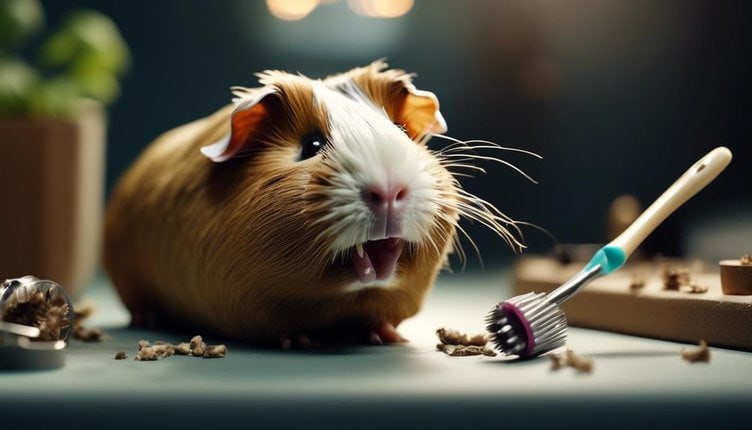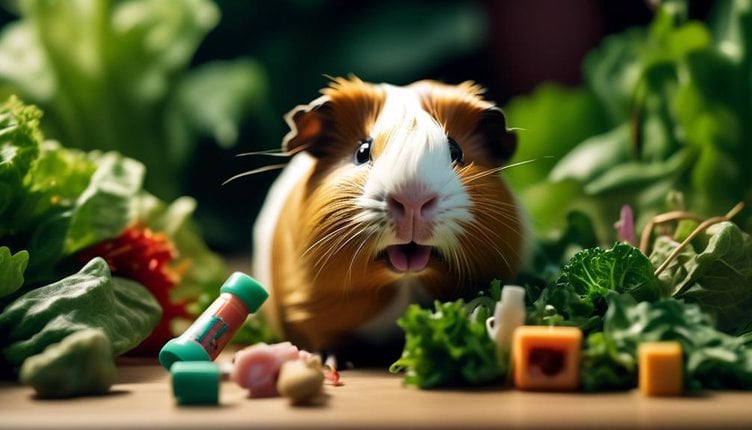Hey there, guinea pig enthusiasts! Let's dive into the fascinating world of guinea pig dental health. These little guys rely on their teeth not just for chomping on their beloved treats, but as a vital component of their overall well-being. Teeth are like the superhero cape of their dental health, which is why it's crucial to understand and address malocclusion – a pesky dental condition that can disrupt their dental harmony. But don't worry, because I'm about to spill the beans on the keys to keeping those pearly whites in tip-top shape.
First things first, let's talk about malocclusion. It's a common issue in guinea pigs where their teeth don't align properly, causing all sorts of trouble. Now, nobody wants their fluffy buddies to experience discomfort, so it's essential to be aware of the signs and symptoms of malocclusion. Keep an eye out for things like difficulty eating, weight loss, drooling, and even the formation of sores in the mouth. If you notice any of these red flags, it's time to take action!
Prevention is key, my friends. To keep malocclusion at bay, make sure your guinea pig has a balanced diet that includes plenty of hay and high-quality pellets. This helps wear down those pearly whites naturally, preventing any misalignment. Oh, and don't forget about the power of chew toys! These little guys love to nibble, so providing them with safe and appropriate chew toys can help keep their teeth in check.
But what if malocclusion has already made its way into your guinea pig's life? Well, fear not! There are ways to manage and treat this condition. The first step is to consult a veterinarian who specializes in exotic animals. They'll be able to assess the severity of the malocclusion and develop a tailored treatment plan for your furry friend. This may include teeth trimming, antibiotics to address any infections, and pain management techniques.
Remember, my fellow guinea pig enthusiasts, dental health is no joke for these little critters. By understanding malocclusion, its causes, symptoms, and prevention methods, you'll be well-equipped to ensure your guinea pig's teeth stay healthy and happy. So go forth, armed with this knowledge, and be the superhero your guinea pig deserves when it comes to their dental care. Your furry friend will thank you with a squeal of delight!
Key Takeaways
- Malocclusion in guinea pigs can be caused by genetic factors, dental abnormalities, poor dental hygiene, improper diet, and mouth injuries.
- Regular dental check-ups are crucial for maintaining guinea pigs' dental health, as they allow for early detection and treatment of dental issues.
- Proper dental care, including regular brushing, a proper diet, and monitoring for signs of dental problems, is essential for preventing pain and discomfort in guinea pigs.
- Veterinary check-ups, dental trimming, dietary adjustments, chew toys, enrichment activities, and dental health supplements can help prevent and treat malocclusion in guinea pigs.
Causes of Malocclusion
Malocclusion, a misalignment of the teeth, can be caused by a variety of factors. When it comes to guinea pigs, there are two main causes of malocclusion: genetic factors and dental abnormalities.
Genetic factors play a significant role in the development of malocclusion in guinea pigs. Some guinea pigs may inherit a predisposition to dental problems, including malocclusion, from their parents. This can be due to genetic mutations or variations that affect the growth and development of the teeth.
Dental abnormalities, on the other hand, can also lead to malocclusion in guinea pigs. These abnormalities can include overgrowth of the teeth, misalignment of the jaws, or the presence of extra teeth. These dental abnormalities can occur as a result of poor dental hygiene, improper diet, or injury to the mouth.
It's important for guinea pig owners to be aware of these causes and take preventive measures to ensure the dental health of their pets. Regular dental check-ups, a balanced diet, and providing appropriate chew toys can help prevent malocclusion in guinea pigs.
Symptoms to Watch Out For
Genetic factors and dental abnormalities can manifest in various symptoms that guinea pig owners should be vigilant about. Recognizing these symptoms is crucial for timely malocclusion treatment and dental health maintenance in guinea pigs.
One prominent symptom of malocclusion is difficulty in eating or a decrease in appetite. Guinea pigs with misaligned teeth may find it challenging to chew and grind their food properly, leading to reduced food intake. Weight loss can occur as a result, further complicating the guinea pig's overall health.
Excessive drooling is another symptom to watch out for. Malocclusion can lead to an overgrowth of teeth, causing pain and discomfort. Guinea pigs may experience difficulty closing their mouths properly, leading to excessive saliva production. This can be observed as drooling or wetness around the mouth area.
In some cases, guinea pigs with malocclusion may exhibit signs of discomfort or pain. They may be more irritable, exhibit changes in behavior, or show signs of distress when touched around their mouth or face. This can indicate that the misaligned teeth are causing discomfort and should be addressed promptly.
Regular dental check-ups and observation of these symptoms are essential for the well-being of guinea pigs. Early detection and malocclusion treatment can prevent further complications and ensure proper dental health maintenance.
Importance of Regular Dental Examinations

Regular dental examinations are essential for maintaining the dental health of guinea pigs. These check-ups allow veterinarians to assess the overall condition of their teeth and identify any potential dental problems early on.
Regular Dental Check-Ups
Regular dental check-ups play a crucial role in maintaining optimal oral health for guinea pigs. Just like humans, guinea pigs also require regular dental examinations to ensure good dental hygiene and prevent dental problems.
During these check-ups, a veterinarian specializing in exotic animals will thoroughly examine the guinea pig's mouth, teeth, and gums to detect any signs of dental disease or malocclusion. They'll also assess the guinea pig's dental cleaning habits and provide recommendations for proper dental care.
Regular dental check-ups allow for early detection and treatment of dental issues, minimizing the risk of complications and discomfort for the guinea pig. Additionally, the veterinarian may perform dental cleaning procedures, such as tartar removal, if necessary, to maintain the guinea pig's oral health.
Preventing Dental Problems
Routine dental examinations are crucial for preventing dental problems and maintaining optimal oral health in guinea pigs. Regular check-ups allow for the early detection of any dental issues, ensuring prompt treatment and preventing further complications. Here are some key reasons why dental examinations are important for guinea pigs:
- Early identification of dental problems: Regular dental examinations enable veterinarians to identify any dental issues such as overgrown teeth, malocclusion, or dental abscesses at an early stage. This allows for timely intervention and prevents the progression of these problems.
- Prevention of pain and discomfort: Dental problems can cause significant pain and discomfort for guinea pigs. Regular dental check-ups help prevent these issues from arising or worsening, ensuring that your furry friend remains comfortable and pain-free.
- Monitoring dental hygiene: Dental examinations provide an opportunity to assess the overall dental hygiene of your guinea pig. This includes checking for plaque buildup, tartar, and gum disease, allowing for timely intervention and prevention of oral health issues.
- Preventing systemic health issues: Dental problems can have a significant impact on the overall health of your guinea pig. Regular dental examinations help identify and treat dental issues that can lead to systemic health problems, such as abscesses or infections spreading to other parts of the body.
Early Detection Benefits
Early detection of dental problems through regular dental examinations is crucial for maintaining optimal oral health in guinea pigs. Early treatment of dental issues can prevent them from progressing and causing further complications.
Regular dental examinations allow for the identification of dental abnormalities such as malocclusion, overgrown teeth, or dental abscesses. By detecting these issues early on, veterinarians can provide appropriate treatment to alleviate pain and discomfort in guinea pigs. Additionally, early treatment can help prevent long-term effects such as difficulty eating, weight loss, and potential infections.
Regular dental examinations also provide an opportunity for owners to receive education on proper oral hygiene and preventive care for their guinea pigs. By prioritizing early detection and treatment, guinea pig owners can ensure the long-term dental health and overall well-being of their furry companions.
Dental Care Tips for Guinea Pig Owners

When it comes to dental care for guinea pigs, there are three key points that every owner should be aware of.
Firstly, regular brushing of the guinea pig's teeth is essential to prevent the buildup of plaque and tartar.
Secondly, providing a proper diet that includes plenty of hay and fresh vegetables can help promote good dental health.
Brushing Guinea Pig Teeth
To maintain optimal dental health for guinea pigs, it's recommended that owners incorporate regular tooth brushing into their pet care routine. Brushing guinea pig teeth is essential for their dental hygiene and offers numerous dental health benefits. Regular tooth brushing helps prevent the buildup of plaque and tartar, reduces the risk of dental diseases, and promotes overall oral health in guinea pigs.
Here are some important tips for brushing your guinea pig's teeth:
- Use a soft-bristled toothbrush specifically designed for small animals.
- Choose a toothpaste formulated for guinea pigs to avoid potential toxicity from human toothpaste ingredients.
- Gently brush the teeth in a circular motion, focusing on the gum line and back molars.
- Start with short brushing sessions, gradually increasing the duration as your guinea pig becomes accustomed to the process.
Proper Diet for Dental Health
Building on the importance of dental hygiene for guinea pigs, a proper diet plays a crucial role in maintaining their dental health. Providing guinea pigs with a diet that promotes dental health is essential in preventing malocclusion and other dental issues.
One aspect of a proper diet is offering recommended treats that are specifically formulated to promote dental health. These treats are designed to be hard and chewy, helping to wear down the guinea pig's constantly growing teeth.
Additionally, providing guinea pigs with chew toys can further aid in maintaining their dental health. Chew toys not only provide entertainment and mental stimulation, but they also help to keep the guinea pig's teeth in check by encouraging them to chew and gnaw.
Signs of Dental Problems
Guinea pig owners should be aware of the signs that indicate dental problems in their furry companions. Identifying these signs early on can help prevent further complications and ensure the overall well-being of the guinea pig. Here are some common signs of dental problems to watch out for:
- Tooth grinding: If you notice your guinea pig grinding their teeth, it could be a sign of dental pain or discomfort. This can occur due to overgrown teeth or misalignment.
- Drooling: Excessive drooling or salivation can be an indication of dental issues. It may occur when a guinea pig's teeth are causing pain or when they're unable to properly chew their food.
- Weight loss: Dental problems can make it difficult for guinea pigs to eat properly, leading to weight loss. If you notice your pet losing weight despite a normal appetite, it's important to check their dental health.
- Change in eating habits: Guinea pigs with dental problems may show a change in their eating habits. They may avoid certain foods or eat less than usual.
Recommended Diet for Dental Health

A well-balanced diet rich in fibrous vegetables and high-quality hay is essential for maintaining optimal dental health in guinea pigs. Guinea pigs have continuously growing teeth, and a proper diet helps wear down their teeth naturally, preventing dental problems such as malocclusion. Malocclusion occurs when the guinea pig's teeth do not align properly, leading to overgrowth and discomfort. To ensure your guinea pig's dental health, it is important to provide them with the right foods.
Here is a table of recommended foods for maintaining guinea pig dental health:
| Food | Benefits |
|---|---|
| Fresh vegetables | Provides necessary fiber for grinding down teeth |
| High-quality hay | Helps wear down teeth and prevents overgrowth |
| Timothy-based pellets | Supplementary food that aids in dental health |
| Chewable guinea pig dental toys | Helps exercise jaw muscles and grind down teeth |
| Dental health supplements | Provides additional nutrients for maintaining dental health |
Incorporating these foods into your guinea pig's diet will promote dental health and prevent dental issues. Additionally, providing chewable guinea pig dental toys and dental health supplements can further support their dental well-being. Remember to consult with a veterinarian to ensure you are providing the appropriate diet and supplements for your guinea pig's specific needs. By serving your guinea pig a well-balanced diet and providing the necessary dental care, you can help them maintain optimal dental health and overall well-being.
Treating Malocclusion in Guinea Pigs
To effectively address malocclusion in guinea pigs, proper veterinary treatment and dental care are crucial. Malocclusion, or misalignment of the teeth, can cause significant discomfort and health issues for these small animals.
Here are some essential tips for treating malocclusion and providing optimal dental care for guinea pigs:
- Regular Veterinary Check-ups: It's important to schedule regular check-ups with a veterinarian experienced in treating small animals. They can diagnose malocclusion and recommend appropriate treatment options.
- Dental Trimming: In cases of malocclusion, the overgrown teeth need to be trimmed regularly to prevent further complications. A veterinarian can safely trim the teeth using specialized instruments.
- Dietary Adjustments: A guinea pig's diet plays a vital role in their dental health. Providing a balanced diet rich in hay, fresh vegetables, and limited pellets can help maintain proper tooth wear and prevent malocclusion.
- Chew Toys and Enrichment: Offering appropriate chew toys and enrichment activities can help promote natural tooth wear and prevent the development of malocclusion.
Preventing Malocclusion: Best Practices for Owners

Owners can take several measures to prevent malocclusion in their guinea pigs and ensure their dental health. One important practice is regular guinea pig teeth trimming. Guinea pigs have continuously growing teeth, and if left unchecked, they can become overgrown, leading to malocclusion. Trimming their teeth every 4-6 weeks helps maintain the proper length and alignment, reducing the risk of malocclusion.
Another effective preventive measure is providing dental health supplements. These supplements contain essential nutrients, such as Vitamin C and calcium, which are vital for maintaining healthy teeth and gums. Owners should consult with a veterinarian to determine the appropriate dosage and type of supplement for their guinea pigs.
In addition to these practices, owners should provide a balanced diet consisting of hay, fresh vegetables, and guinea pig pellets. Hay plays a crucial role in wearing down their teeth naturally while providing essential fiber. Fresh vegetables and pellets supply additional nutrients necessary for dental health.
Regular check-ups with a veterinarian are also essential for preventing malocclusion. They can assess the guinea pig's dental health, identify any potential issues, and provide necessary treatment or advice.
Frequently Asked Questions
Can Malocclusion in Guinea Pigs Be Hereditary?
Yes, malocclusion in guinea pigs can be hereditary. Genetic factors play a significant role in the development of this condition. However, environmental factors such as diet and dental care can also contribute to its severity.
Is Malocclusion More Common in Certain Breeds of Guinea Pigs?
Breeds prone to malocclusion include the Teddy, Rex, and Abyssinian guinea pigs. Factors contributing to malocclusion in guinea pigs include genetics, improper diet, and lack of chew toys.
Are There Any Alternative Treatments for Malocclusion Besides Dental Trimming?
There are non-surgical options available as alternative treatments for malocclusion in guinea pigs. These options can be explored alongside dental trimming to address the dental health issue and ensure the well-being of the animal.
Can Malocclusion in Guinea Pigs Be Reversed With Proper Dental Care?
Proper dental care can potentially reverse malocclusion in guinea pigs. Reversal is achieved through regular dental examinations, teeth trimming, and providing a balanced diet consisting of hay and chew toys to maintain healthy teeth alignment.
How Often Should Guinea Pigs With Malocclusion Undergo Dental Examinations?
Guinea pigs with malocclusion should undergo dental examinations regularly to ensure their dental health. The frequency of these examinations depends on the severity of the malocclusion and the recommendations of a veterinarian. Regular dental care is essential for managing malocclusion in guinea pigs.





